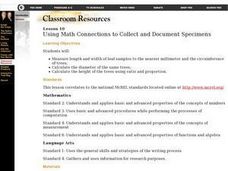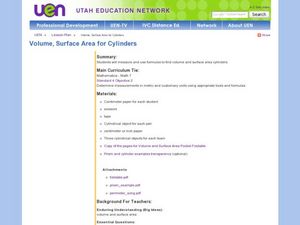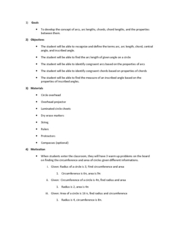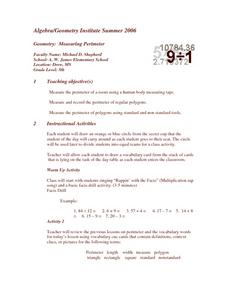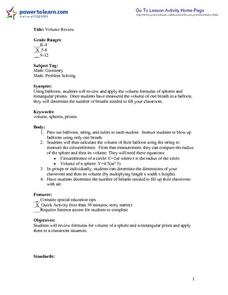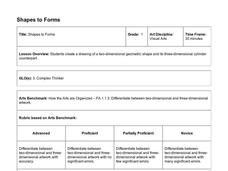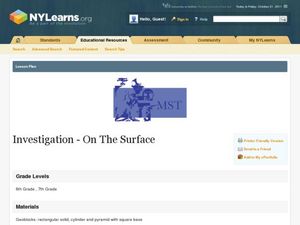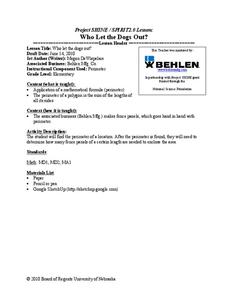EngageNY
The Binomial Theorem
Investigate patterns in the binomial theorem. Pupils begin by reviewing the coefficients from Pascal's triangle. They look at the individual terms, the sums of the coefficients on a row, and the alternating sum of each row. Individuals...
Curated OER
Cylinder Volume Lesson Plan
Tenth graders define the formula for cylinders and use it to solve real world problems. For this geometry lesson, pupils differentiate between area, perimeters, 2D shapes, 3D shapes, and volume of prisms, cylinders and spheres. They...
Curated OER
Troublesome Towers
Students observe solids and identify parts that make up the surface area. In this geometry lesson, students calculate the surface are of solids and cones. They find polygons and solids in the real world.
Curated OER
Using Math Concepts to Collect and Document Specimens
Students determine the length and width of leaf samples to the nearest millimeter and the circumference of trees. They participate in a discussion about the importance of collecting specimens carefully. They compile accurate...
Curated OER
Calendar Math
Students count and name the numbers and days on the calendar in order to determine the date. They identify the month and the entire date, and determine the pattern shown on the calendar markers. Students then calculate how many days...
Curated OER
Square Circles
Students analyze and demonstrate how a circle can be measured in square units and examine how diameter, circumference and radius are related.
Curated OER
Area graphics for 7th graders
Pupils randomly select dimensions for three geometric shapes (square, right triangle and circle). From the graphs they compare and contrast the graphical results of each shape.
Curated OER
Moving On: Octagoning the Circle
Learners explore circles through the use of octagons. They inscribe a circle in a regular octagon and find the area and perimeter of the hexagon with respect to the radius of the circle. Students present their findings to the class.
Curated OER
Volume, Surface Area for Cylinders
Seventh graders explore the concept of volume and surface area of cylinders. In this volume and surface area of cylinders lesson, 7th graders break cylinders into their base shapes of a circle and a rectangle. Students discover that...
Curated OER
Properties of Arcs, Lengths and Chords
Young scholars differentiate between the different properties of arcs, arc lengths, chords, and chord lengths. In this circles lesson, students calculate the arc length of a given circle, and find the measure of the inscribed angles of a...
Illustrative Mathematics
Toilet Roll
Potty humor is always a big hit with the school-age crowd, and potty algebra takes this topic to a whole new level. Here the class develops a model that connects the dimensions (radii, paper thickness, and length of paper) of a...
EngageNY
General Pyramids and Cones and Their Cross-Sections
Are pyramids and cones similar in definition to prisms and cylinders? By examining the definitions, pupils determine that pyramids and cones are subsets of general cones. Working in groups, they continue to investigate the relationships...
Curated OER
A Cone and Its Net
Create and investigate nets for solid shapes with your class. They identify the different parts and faces of each polygon and solid then calculate the surface area and volume of cones. They use circle sectors of varying sizes to build...
Curated OER
Measuring Perimeter
Have your class practice measuring the perimeter of various objects using this resource. Fifth graders place various-sized polygons in order (from largest to smallest). They use non-standard measuring tools to estimate the distance...
Curated OER
Linear Equations & Manipulatives
High schooler math students review operations and solve linear equations using manipulatives--squares, cubes, circles, and cups. They transfer the operations performed on the manipulatives in equation form.
Curated OER
Volume Review
Pupils investigate the concepts of volume for rectangular prisms and spheres. They measure the volume of one balloon and then consider how many breaths it would take to fill the room with balloons. The rectangular prism being measured is...
Curated OER
Shapes to Forms
Here is a math lesson that is really a visual arts lesson in disguise! In it, pupils utilize their knowledge of geometric shapes and forms to create a detailed version of a cylinder. The instructions on how to go about the task are very...
Curated OER
Investigation- On The Surface
Learners will examine solids to determine which has the least surface area. They will also understand the use of units, square units, and cubic units. There is also the teaching and application of geometry formulas to perform calculations.
Curated OER
Building Bridges
Learners identify the different types of bridges. Using the internet, they research information on how they are built by completing a scavenger hunt. Locating a specific area, they determine which type of bridge would be appropriate and...
Curated OER
Solving Math Problems In the Real World
Upper elementary and middles schoolers discuss and solve real world applications of math. They use formulas for volume and percents to answer real world questions. In the second part of the lesson plan, groups write and solve word...
Curated OER
Who Let the Dogs Out?
Pupils calculate the perimeter and area of polygons. In this geometry activity, students apply formulas of perimeter to solve geometric problems. They calculate the area of a dog fence and create ways to keep the dog in that area.
Curated OER
Linear/Planar Geometry - Week 5
In this linear and planar geometry worksheet, students use the Pythagorean Theorem, equation of a line, slope of a line and area formulas to solve problems. This three-page worksheet contains seven problems.
Curated OER
Measurement, Perimeter and Area
Students explore the concept of measurement. In this measurement lesson, students collect data about themselves such as height, finger length, neck circumference, foot length, and other body measurements. Students cut squares...
Curated OER
Angles and Arcs
Students identify the relationship between angles and arcs. In this geometry lesson, students rotate and move the circle around to create different arcs on the TI-Navigator. They differentiate between major and minor arcs.



